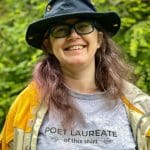The first-read takeaway is the content, not form: some people lose the parenting lottery. An addict mother that is creepy and egocentric. A trial of a wife so much so that even the husband doesn’t want her ashes. And yet the title takes the blame, that being subject to abuse, one fails as a daughter. It is not called Antonyms for Mother from the mother not being in a position to provide the support and care for an upbringing. Certainly being the adult in the parent-child relationship to one’s emotionally-manipulative parent makes for a tangle of feelings, of ever-extending responsibility in a way that doesn’t happen when the parent is physically ill.
“This sense of culpability and helplessness for another life that can’t be shaken runs through the book.”
The poems are a mind divided against itself, a tension between what is and what could have been. This duality is life and yet feels like death “I sever one in half. you say the worm is just fine;/each half will grow into a new hole, two hearts,/as though the inevitable will always be denied.” (p. 30) Analogously in my life, the guilt of farming when my uncle and cousin insisted that snakes cut in half by baling machines can continue living. Mystic thinking assuages culpability. It’s a coping strategy. Any coping strategy is a port in a storm.
This sense of culpability and helplessness for another life that can’t be shaken runs through the book. One can’t get away and can’t fix the mother. You want to protect self and the other which is a mutually exclusive aim when the other is bent on self-harm. As in any abusive relationship, romantic or familiar there is a mixing of good memories, of in this case, gardening together. The plants become a synecdoche for the mother, “p, 37 “you promised me/ that a plant returned/to the sill/after many dark months//will eventually bend/ towards the light” Heartbreakingly the light is elusive and calls are hard.
The recurrent word antonym acts as signal of recognition of distortion from the ideal. “Antonyms for inheritance” (p. 45) is wanting the mother to be a lesson not an example. “Antonym of Lullaby” is rancour keeps you awake. A child needs acceptance more than corrective judgement. I can certainly relate to mother chastising fatness, being unladylike, not doing female right. It’s a shitty situation and once the mother is gone, how to rewrite except by yourself in poetry.
it’s not always graspable, as Boychuk puts in “After we fight about suicide” (p. 20) when a retreat into the forest’s fog, easily understood as brain fog distorting the mind with “the neck of the woods//caught in a loose noose”. How to reconcile sense to behaviour that doesn’t look sustainable yet is sustained for decades nonetheless? (p. 24) “despite the fistfuls/of pills she chases/with spills of vodka.// it seems death has never/really wanted her”. That middle land of not recovered, not succumbed “What horrific joy”.
Sections III and IV are the healing journey after the parent’s death. The person wonders by nature or by nurture, will I echo this life path? Can it be avoided? On p. 68 particularly struck me as my mother prided the photos of her and I at the same age looking as the same person,
In a drawer there’s a photo
of my mother looking
exactly like me. In a drawer
there’s a photo of me looking
older than I can imagine.
With generational trauma, it’s hard to know how to pick the locks of epigenetic expression.
The Yoga instructor says” (p. 57) “Find the space in your body/where no storm has hit, and the trees//are still standing”. Each generation has to plant the saplings felled before their lifetime and perhaps largely for the benefit of the generation afterwards who will seek shade. It seems regrowing the forest of resiliency takes decades. In the safety of no further external attacks, there’s room to process the depression and grief, the new understory that wishes to grow strong and green. The book itself ends on a hopeful and self-assured note that after all these storms, there is life.
The title gets a second interpretation, that the writer will be make a daughter for whom the word daughter is the antonymy of what she experienced to be “daughter”. A good book for many people who can relate to such an upbringing and for those who were privileged with a healthy home life.
Jenny Boychuk was born in New Westminster, British Columbia, and holds an MFA from the University of Michigan Helen Zell Writers’ Program. Her poems and essays have appeared in The Walrus, CBC Books, Best New Poets 2016, The Malahat Review, The Fiddlehead,, Grain, The New Quarterly, PRISM international, among other publications. In 2018, she won the Copper Nickel Editors’ Prize in Poetry. She is also the winner of the 2019 CBC Nonfiction Prize. She lives in Victoria, British Columbia.
- Publisher : Signal Editions (Sept. 15 2021)
- Language : English
- Paperback : 75 pages
- ISBN-10 : 1550655817
- ISBN-13 : 978-1550655810
Pearl Pirie's WriteBulb is now available at the Apple store. A prompt app for iOS 15 and up gives writing achievement badges. Pirie’s 4th poetry collection was footlights (Radiant Press, 2020). rain’s small gestures (Apt 9 Press, 2021), minimalist poems, won the 2022 Nelson Ball Prize. Forthcoming chapbooks from Catkin Press and Turret House. Find more at www.pearlpirie.com or at patreon.com/pearlpiriepoet










